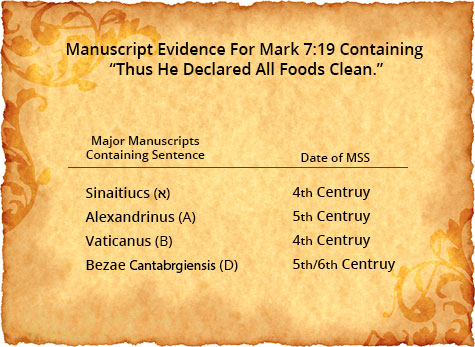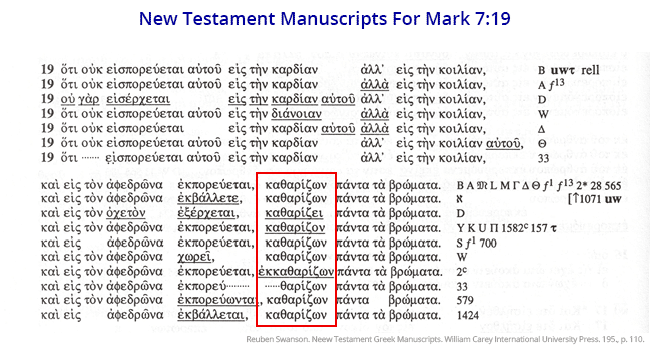Bible Question:
Was 'thus He declared all foods clean' inserted by man? - Mark 7:19
Bible Answer:
Our question is: should Mark 7:19 contain the sentence “Thus He declared all foods clean“?
Thus He declared all foods clean. Mark 7:19 (NASB)
There are some who not believe the sentence should be included in Mark 7:19. They reason the sentence was not originally in the gospel of Mark. This is significant since one very important principle of biblical interpretation is that we should not base any doctrine or teaching on an uncertain reading. Words and verses are uncertain when there is insufficient manuscript evidence to support their inclusion in the Bible. Those who claim that “Thus He declared all foods clean” should not be in Mark 7:19 argue that a copyist inserted the verse. They claim the best and oldest manuscripts of the gospel of Mark do not contain the verse. Therefore, they say Jesus never taught that we can eat any food that we desire. The implication is that we must still keep the Mosaic food laws prescribed in Leviticus 11:1-47 and Deuteronomy 14:1-21. In these passages God told the nation of Israel that some animals were unclean and some were clean. They could not eat the unclean animals. Therefore, our question is: should “Thus He declared all foods clean.” be included in Mark 7:19.

Manuscript Evidence For Mark 7:19
The chart below is provided by Reuben Swanson in New Testament Greek Manuscripts. The chart provides a quick summary of the major manuscripts that are used by textual criticism to determine the reading for Mark 7:19.

The Greek corresponding to the sentence “Thus He declared all foods clean” is καθαρίζων πάντα τὰ βρώματα. The Greek words in this sentence are καθαρίζων, πάντα and βρώματα. They mean “to clean,” “all” and “foods,” respectively. That is, “all foods are clean.” “Thus he delcared” is implied. The critical word in this sentence is καθαρίζων since the word describes the foods as being clean.
It is important to note the various manuscript readings for Mark 7:9 appear at the right in the chart. The chart reveals that four very old and reliable manuscripts do contain the Greek sentence and the key word καθαρίζων. These four manuscripts are the Sinaitiucs (ַָא), Alexandrinus (A), Vaticanus (B) and the Bezae Cantabrgiensis (D). That is, these highly respected and very old manuscripts all contain the reading “Thus He declared all foods clean.” On the basis of the manuscript evidence, the sentence does belong in Mark 7:19.
Bruce Metzger, the recognized scholar of textual criticism in the modern era, summarizes the evidence as follows,
The overwhelming weight of manuscript evidence supports the reading καθαριζων. The difficulty of construing this word in the sentence prompted copyists to attempt various corrections and ameliorations.[1]
That is, the sentence “Thus He declared all foods clean” belongs in Mark 7:19.
Meaning of “Thus He declared all foods clean.”
What is the meaning of Mark 7:19? It is important to read verse 18, which precedes verse 19.
And He said to them, “Are you so lacking in understanding also? Do you not understand that whatever goes into the man from outside cannot defile him, because it does not go into his heart, but into his stomach, and is eliminated?” (Thus He declared all foods clean.) Mark 7:18-19 (NASB)
In verse 18 Jesus tells us that what goes into a man’s mouth and into his stomach cannot defile him. What defiles a man is what is in the heart. Therefore, verse 19 concludes that all foods are clean. Thus the Mosaic food laws no longer exist. We can now eat any food, including those from the animals that the Mosaic law consider unclean.
But even if the sentence “Thus He declared all foods clean” did not belong in Mark 7:19, the teaching of the verse still applies since the elimination of the Mosaic food laws are taught elsewhere (Acts 10:9-16; 11:2-12; 13:38-41; 1 Timothy 4:1-5). For more information read, “Is it a sin to eat unclean animals today?”
Conclusion:
The New American Standard Bible (NASB) places parentheses around the sentence “Thus He declared all foods clean.” Consequently, some have unfortunately concluded that maybe the sentence should not be included in Mark 7:19. But the parentheses were included because “Thus He declared all foods clean” is a parenthetical comment. Normally, the NASB uses square brackets to indicate doubtful readings. Unfortunately, readers confuse the parentheses for square brackets. The NASB has not indicated that “Thus He declared all foods clean” is in doubt but is a parenthetical comment – a comment of explanation.
References:
1. Reuben Swanson. Mark. New Testament Greek Manuscripts. William Carey International University Press. 1995. p. 110.
2. Bruce M Metzger. A Textual Commentary on the Greek New Testament. United Bible Societies. 1994. p.
Suggested Links:
Why is verse 11 missing in Matthew 18?Why is angry “without a cause” in Matthew 5:22 in only the KJV and NKJV?
Should verses 9-20 be included at the end of Mark 16?
Why is Matthew 17:21 missing or only a footnote in my Bible?
Woman Caught In Adultery
Are any of the English Bible translations 100% accurate?
Is it a sin to eat unclean animals today?